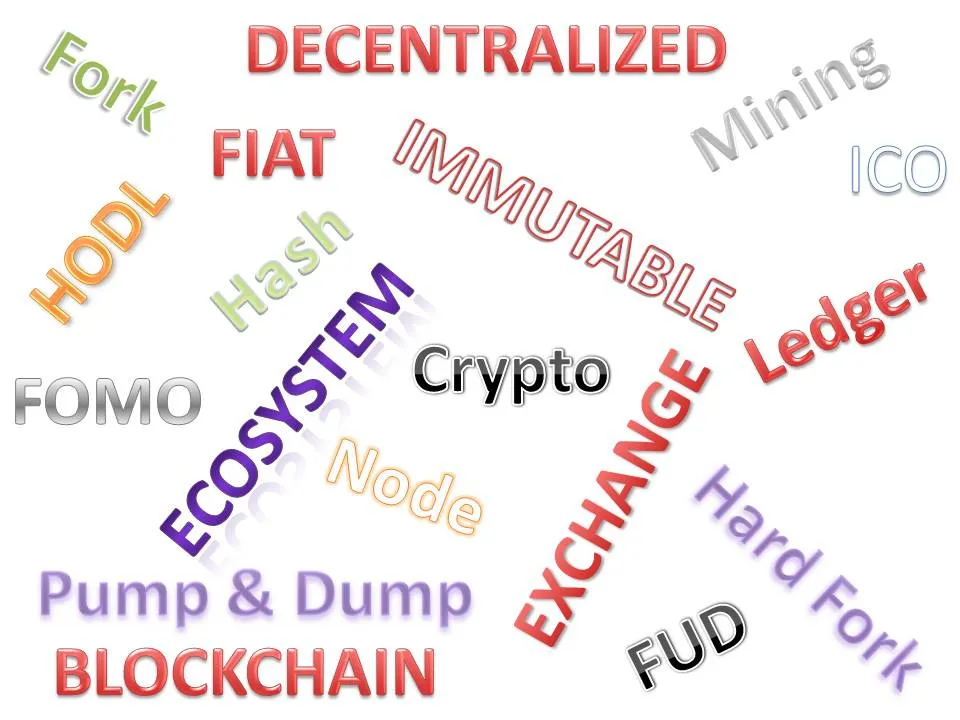
For most of us here on Steemit, when we hear words like blockchain, ledger, fork, hash, ecosystem, fiat, exchange, mining, decentralized, node, immutable - we all at least have a basic understanding of what the words mean, and we can correlate each of those words to their specific function within the cryptocurrency universe.
Cryptocurrencies have even spawned their very own list of crypto specific acronyms like ICO, FOMO, FUD, HODL, and P&D, that are sometimes extremely confusing in their actual meaning, and you genuinely might have more luck deciphering letters of the government alphabet soup spy agencies we hear so much about.
Some of us in fact, for lack of a better word, are “brilliant” in the understanding of these words and phrases - at a glance some can easily distinguish the difference between a distributed and a central ledger, the difference between a public and a private key, and the individual nuances of proof of work, proof of stake, and proof of brain as they relate to any specific currency. Our understanding of these words and terms didn’t happen overnight, and for many of us (myself included) trying to decipher the who, what, when, where, and why, can be incredibly daunting.
We are constantly hearing decentralized this, immutable that, exchange this, ledger that - isn’t Fiat just a crappy Italian car anyhow? The underlying meanings, the implications, and the nuances of these words sometimes are best left to the most brilliant of us to figure out - but sometimes they’re not.
Sometimes it’s up to us to do our own homework, know what the hell’s going on, and make sure we know precisely the who, what, when, where, and why, because the consequences of not knowing always becomes much more expensive in the end, and often with much more than just a monetary cost.
So what does any of this have to do with the price of tea in China, or the price of Steem in Brazil for that matter? What could possibly connect the price of BitShares in Australia, the price of cars in Japan, and the price of NEO in Germany? Which of our cryptocurrency related words is best suited to bind each of the examples together, and what are the implications for not only each and every crypto and country, but for each and every one of us?
What words come to mind when you consider taking your hard earned Dollars, Yuan, Euros, Rubles, Yen, or Pesos, and buying any of the various digital currencies out there? I can tell you what words I tend to think of first, “pain in the ass” immediately comes to mind, and if I had to describe the current system for buying and selling digital currencies using only one word, “sucks” would have to be it.
The recent rapid expansion of digital currencies into the mainstream, has prompted a group of the most brilliant minds among us, to come up with a plan to fix the buying and selling nightmare. They’ve developed an innovative mechanism for exchanging fiat currency into digital currency and vice versa. They have all but eliminated most, if not all of the problems associated with centralized exchanges, and the risks to both buyers and sellers inherent in person to person transfers, are no longer an issue.
So if you’re interested in eliminating the “pain in the ass” of buying and selling digital currencies, and you want to turn the “sucks” into something that… well, into something that doesn’t suck. Or maybe you just want to know what "words" best describe the correlation between someone selling tea in China, buying NEO in Germany, selling BitShares in Australia, and buying Steem in Brazil?
Either way, you need to stop what you’re doing right now – no seriously, stop right now and get over to Streamity, a truly decentralized cryptocurrency exchange for the blockchain generation…
Streamity Website
Streamity One Pager
Streamity Whitepaper
Streamity YouTube
Streamity Facebook
Streamity Medium
Streamity Twitter
Streamity Telegram
Streamity Bitcoin Talk
@originalworks Sponsored Writing Contest... Streamity
streamity2018